- Home
- H. Beam Piper
Four-Day Planet Page 3
Four-Day Planet Read online
Page 3
3
BOTTOM LEVEL
It didn't take long to get Murell's luggage assembled. There wassurprisingly little of it, and nothing that looked like photographicor recording equipment. When he returned from a final gathering-up inhis stateroom, I noticed that he was bulging under his jacket, too, onthe left side at the waist. About enough for an 8.5-mm pocketautomatic. Evidently he had been briefed on the law-and-ordersituation in Port Sandor.
Normally, we'd have gone off onto the Main City Level, but Tom's jeepwas down on the Bottom Level, and he made no suggestion that we go offand wait for him to bring it up. I didn't suggest it, either. Afterall, it was his jeep, and he wasn't our hired pilot. Besides, I wasbeginning to get curious. An abnormally large bump of curiosity ispart of every newsman's basic equipment.
We borrowed a small handling-lifter and one of the spaceportroustabouts to tow it for us, loaded Murell's luggage and my thingsonto it, and started down to the bottomside cargo hatches, from whichthe ship was discharging. There was no cargo at all to go aboard,except mail and things like Adolf Lautier's old film and music tapes.Our only export is tallow-wax, and it all goes to Terra. It would bepicked up by the Cape _Canaveral_ when she got in from Odin fivehundred hours from now. But except for a few luxury items from Odin,everything we import comes from Terra, and the _Peenemuende_ hadstarted discharging that already. We rode down on a contragravity skidloaded with ammunition. I saw Murell looking curiously at the squarecases, marked TERRAN FEDERATION ARMED FORCES, and 50-MM, MK. 608,ANTIVEHICLE AND ANTIPERSONNEL, 25 ROUNDS, and OVERAGE. PRACTICE ONLY.NOT TO BE ISSUED FOR SERVICE, and INSPECTED AND CONDEMNED. The huntersbought that stuff through the Co-op. It cost half as much as new ammo,but that didn't help them any. The difference stopped with SteveRavick. Murell didn't comment, and neither did Tom or I.
We got off at the bottom of the pit, a thousand feet below thepromenade from which I had come aboard, and stopped for a moment.Murell was looking about the great amphitheater in amazement.
"I knew this spaceport would be big when I found out that the shiplanded directly on the planet," he said, "but I never expectedanything like this. And this serves a population of twenty thousand?"
"Twenty-four thousand, seven hundred and eight, if the man who gotpounded in a barroom fight around 1330 hasn't died yet," I said. "Butyou have to remember that this place was built close to a hundredyears ago, when the population was ten times that much." I'd gotten mystory from him; now it was his turn to interview me. "You knowsomething about the history of Fenris, I suppose?"
"Yes. There are ample sources for it on Terra, up to the collapse ofthe Fenris Company," he said. "Too much isn't known about what's beenhappening here since, which is why I decided to do this book."
"Well, there were several cities built, over on the mainland," I toldhim. "They're all abandoned now. The first one was a conventionalcity, the buildings all on the surface. After one day-and-night cycle,they found that it was uninhabitable. It was left unfinished. Thenthey started digging in. The Chartered Fenris Company shipped in hugequantities of mining and earth-moving equipment--that put the companyin the red more than anything else--and they began makingburrow-cities, like the ones built in the Northern Hemisphere of Terraduring the Third and Fourth World Wars, or like the cities on Luna andMercury Twilight Zone and Titan. There are a lot of valuable mineraldeposits over on the mainland; maybe in another century ourgrandchildren will start working them again.
"But about six years before the Fenris Company went to pieces, theydecided to concentrate in one city, here in the archipelago. The seawater stays cooler in the daytime and doesn't lose heat so rapidly inthe nighttime. So they built Port Sandor, here on Oakleaf Island."
"And for convenience in monster-hunting?"
I shook my head. "No. The Jarvis's sea-monster wasn't discovered untilafter the city was built, and it was years after the company had gonebankrupt before anybody found out about what tallow-wax was goodfor."
I started telling him about the native life-forms of Fenris. Becauseof the surface temperature extremes, the marine life is the mosthighly developed. The land animals are active during the periods aftersunset and after sunrise; when it begins getting colder or hotter,they burrow, or crawl into caves and crevices among the rocks, and gointo suspended animation. I found that he'd read up on that, and nottoo much of his information was incorrect.
He seemed to think, though, that Port Sandor had also been mined outbelow the surface. I set him right on that.
"You saw what it looked like when you were coming down," I said. "Justa flat plateau, with a few shaft-head domes here and there, and thelanding pit of the spaceport. Well, originally it was a valley,between two low hills. The city was built in the valley, level bylevel, and then the tops of the hills were dug off and bulldozed downon top of it. We have a lot of film at the public library of theconstruction of the city, step by step. As far as I know, there are nocopies anywhere off-planet."
He should have gotten excited about that, and wanted to see them.Instead, he was watching the cargo come off--food-stuffs, now--andwanted to know if we had to import everything we needed.
"Oh, no. We're going in on the Bottom Level, which is mainly storage,but we have hydroponic farms for our vegetables and carnicultureplants for meat on the Second and Third Levels. That's counting downfrom the Main City Level. We make our own lumber, out of reedsharvested in the swamps after sunrise and converted to pulpwood, andwe get some good hardwood from the native trees which only grow infour periods of two hundred hours a year. We only use that forfurniture, gunstocks, that sort of thing. And there are a couple ofmining camps and smelters on the mainland; they employ about athousand of our people. But every millisol that's spent on this planetis gotten from the sale of tallow-wax, at second or third hand if notdirectly."
That seemed to interest him more. Maybe his book, if he was reallywriting one, was going to be an economic study of Fenris. Or maybe hisracket, whatever it was, would be based on something connected withour local production. I went on telling him about our hydroponicfarms, and the carniculture plant where any kind of animal tissue wewanted was grown--Terran pork and beef and poultry, Freyan _zhoumy_meat, Zarathustran veldtbeest.... He knew, already, that none of thenative life-forms, animal or vegetable, were edible by Terrans.
"You can get all the _pate de foie gras_ you want here," I said. "Wehave a chunk of goose liver about fifty feet in diameter growing inone of our vats."
By this time, we'd gotten across the bottom of the pit, Murell'sluggage and my equipment being towed after us, and had entered theBottom Level. It was cool and pleasant here, lighted from the ceilingfifty feet overhead, among the great column bases, two hundred feetsquare and two hundred yards apart, that supported the upper city andthe thick roof of rock and earth that insulated it. The area we wereentering was stacked with tallow-wax waiting to be loaded onto the_Cape Canaveral_ when she came in; it was vacuum-packed in plasticskins, like big half-ton Bologna sausages, each one painted with theblue and white emblem of the Hunters' Co-operative. He was quiteinterested in that, and was figuring, mentally, how much wax there washere and how much it was worth.
"Who does this belong to?" he wanted to know. "The Hunters'Co-operative?"
Tom had been letting me do the talking up to now, but he answered thatquestion, very emphatically.
"No, it doesn't. It belongs to the hunters," he said. "Each ship crewowns the wax they bring in in common, and it's sold for them by theCo-op. When the captain gets paid for the wax he's turned over to theCo-op, he divides the money among the crew. But every scrap of thisbelongs to the ships that took it, up till it's bought and paid for byKapstaad Chemical."
"Well, if a captain wants his wax back, after it's been turned overfor sale to the Co-op, can he get it?" Murell asked.
"Absolutely!"
Murell nodded, and we went on. The roustabout who had been followingus with the lifter had stopped to chat with a couple of his fellows.We went on slowly, and now and t
hen a vehicle, usually a lorry, wouldpass above us. Then I saw Bish Ware, ahead, sitting on a sausage ofwax, talking to one of the Spaceport Police. They were both smoking,but that was all right. Tallow-wax will burn, and a wax fire issomething to get really excited about, but the ignition point is 750 deg. C.,and that's a lot hotter than the end of anybody's cigar. He musthave come out the same way we did, and I added that to the"wonder-why" file. Pretty soon, I'd have so many questions to wonderabout that they'd start answering each other. He saw us and waved tous, and then suddenly the spaceport cop's face got as white as myshirt and he grabbed Bish by the arm. Bish didn't change color; hejust shook off the cop's hand, got to his feet, dropped his cigar, andtook a side skip out into the aisle.
"Murell!" he yelled. "Freeze! On your life; don't move a muscle!"
Then there was a gun going off in his hand. I didn't see him reach forit, or where he drew it from. It was just in his hand, firing, and theempty brass flew up and came down on the concrete with a jingle on theheels of the report. We had all stopped short, and the roustabout whowas towing the lifter came hurrying up. Murell simply stood gaping atBish.
"All right," Bish said, slipping his gun back into a shoulder holsterunder his coat. "Step carefully to your left. Don't move right atall."
Murell, still in a sort of trance, obeyed. As he did I looked past hisright shin and saw what Bish had been shooting at. It was an irregulargray oval, about sixteen inches by four at its widest and tapering upin front to a cone about six inches high, into which a rodlike member,darker gray, was slowly collapsing and dribbling oily yellow stuff.The bullet had gone clear through and made a mess of dirty gray andblack and green body fluids on the concrete.
It was what we call a tread-snail, because it moves on a double row ofpads like stumpy feet and leaves a trail like a tractor. Thefishpole-aerial thing it had erected out of its head was its stinger,and the yellow stuff was venom. A tenth of a milligram of it in yourblood and it's "Get the Gate open, St. Peter; here I come."
Tom saw it as soon as I did. His face got the same color as the cop's.I don't suppose mine looked any better. When Murell saw what had beenbuddying up to him, I will swear, on a warehouse full of Bibles,Korans, Torah scrolls, Satanist grimoires, Buddhist prayer wheels andThoran Grandfather-God images, that his hair literally stood on end.I've heard that expression all my life; well, this time I really sawit happen. I mentioned that he seemed to have been reading up on thelocal fauna.
I looked down at his right leg. He hadn't been stung--if he had, hewouldn't be breathing now--but he had been squirted, and there were acouple of yellow stains on the cloth of his trouser leg. I told him tohold still, used my left hand to pull the cloth away from his leg, andgot out my knife and flipped it open with the other hand, cutting awaythe poisoned cloth and dropping it on the dead snail.
Murell started making an outcry about cutting up his trousers, andsaid he could have had them cleaned. Bish Ware, coming up, told him tostop talking like an imbecile.
"No cleaner would touch them, and even if they were cleaned, some ofthe poison would remain in the fabric. Then, the next time you werecaught in the rain with a scratch on your leg, Walt, here, wouldwrite you one of his very nicest obituaries."
Then he turned to the cop, who was gabbling into his belt radio, andsaid: "Get an ambulance, quick. Possible case of tread-snail skinpoisoning." A moment later, looking at Murell's leg, he added, "Omit'possible.'"
There were a couple of little spots on Murell's skin that werebeginning to turn raw-liver color. The raw poison hadn't gotten intohis blood, but some of it, with impurities, had filtered through thecloth, and he'd absorbed enough of it through his skin to make himseriously ill. The cop jabbered some more into the radio, and thelaborer with the lifter brought it and let it down, and Murell satdown on his luggage. Tom lit a cigarette and gave it to him, and toldhim to remain perfectly still. In a couple of minutes, an ambulancewas coming, its siren howling.
The pilot and his helper were both jackleg medics, at least as far asfirst aid. They gave him a drink out of a flask, smeared a lot of gunkon the spots and slapped plasters over them, and helped him into theambulance, after I told him we'd take his things to the _Times_building.
By this time, between the shot and the siren, quite a crowd hadgathered, and everybody was having a nice little recrimination party.The labor foreman was chewing the cop out. The warehousesuperintendent was chewing him out. And somebody from the generalsuperintendent's office was chewing out everybody indiscriminately,and at the same time mentioning to me that Mr. Fieschi, thesuperintendent, would be very much pleased if the _Times_ didn'tmention the incident at all. I told him that was editorial policy,and to talk to Dad about it. Nobody had any idea how the thing hadgotten in, but that wasn't much of a mystery. The Bottom Level is fullof things like that; they can stay active all the time because thetemperature is constant. I supposed that eventually they'd pick thedumbest day laborer in the place and make him the patsy.
Tom stood watching the ambulance whisk Murell off, dithering inindecision. The poisoning of Murell seemed like an unexpected blow tohim. That fitted what I'd begun to think. Finally, he motioned thelaborer to pick up the lifter, and we started off toward where he hadparked his jeep, outside the spaceport area.
Bish walked along with us, drawing his pistol and replacing the firedround in the magazine. I noticed that it was a 10-mm Colt-ArgentineFederation Service, commercial type. There aren't many of those onFenris. A lot of 10-mm's, but mostly South African Sterbergs orVickers-Bothas, or Mars-Consolidated Police Specials. Mine, which Iwasn't carrying at the moment, was a Sterberg 7.7-mm Olympic Match.
"You know," he said, sliding the gun back under his coat, "I would bejust as well pleased as Mr. Fieschi if this didn't get any publicity.If you do publish anything about it, I wish you'd minimize my own partin it. As you have noticed, I have some slight proficiency with lethalhardware. This I would prefer not to advertise. I can usually avoidtrouble, but when I can't, I would like to retain the advantage ofsurprise."
We all got into the jeep. Tom, not too graciously, offered to dropBish wherever he was going. Bish said he was going to the _Times_, soTom lifted the jeep and cut in the horizontal drive. We got into abusy one-way aisle, crowded with lorries hauling food-stuffs to therefrigeration area. He followed that for a short distance, and thenturned off into a dimly lighted, disused area.
Before long, I began noticing stacks of tallow-wax, put up in theregular outside sausage skins but without the Co-op markings. Theyjust had the names of hunter-ships--_Javelin_, _Bulldog_, _Helldiver_,_Slasher_, and so on.
"What's that stuff doing in here?" I asked. "It's a long way from thedocks, and a long way from the spaceport."
"Oh, just temporary storage," Tom said. "It hasn't been checked inwith the Co-op yet."
That wasn't any answer--or maybe it was. I let it go at that. Then wecame to an open space about fifty feet square. There was a jeep, witha 7-mm machine gun mounted on it, and half a dozen men in boat-clotheswere playing cards at a table made out of empty ammunition boxes. Inoticed they were all wearing pistols, and when a couple of them sawus, they got up and grabbed rifles. Tom let down and got out of thejeep, going over and talking with them for a few minutes. What he hadto tell them didn't seem to bring any noticeable amount of sunlightinto their lives. After a while he came back, climbed in at thecontrols, and lifted the jeep again.

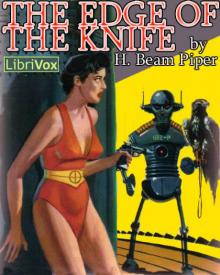 The Edge of the Knife
The Edge of the Knife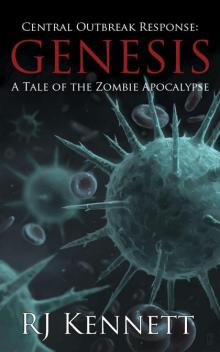 Genesis
Genesis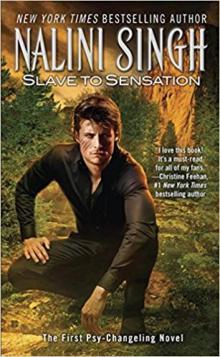 A Slave is a Slave
A Slave is a Slave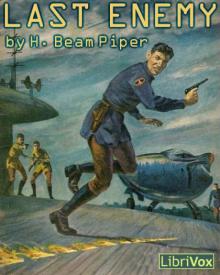 Last Enemy
Last Enemy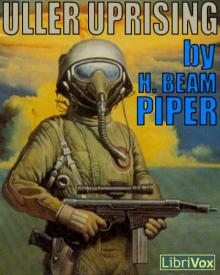 Uller Uprising
Uller Uprising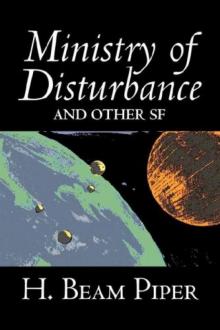 Ministry of Disturbance
Ministry of Disturbance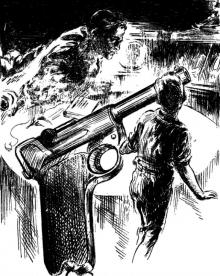 Time and Time Again
Time and Time Again The Mercenaries
The Mercenaries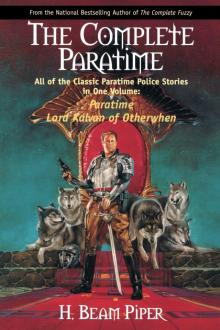 Police Operation
Police Operation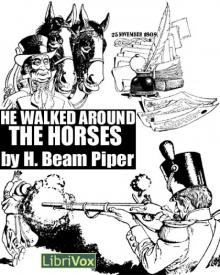 He Walked Around the Horses
He Walked Around the Horses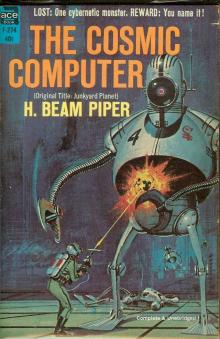 Time Crime
Time Crime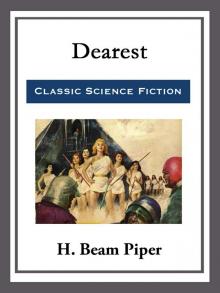 Dearest
Dearest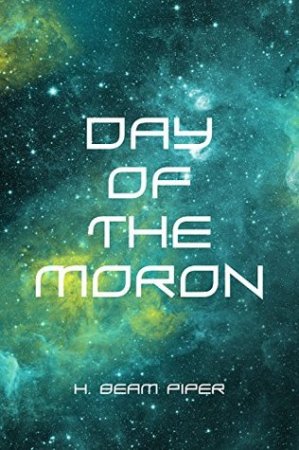 Day of the Moron
Day of the Moron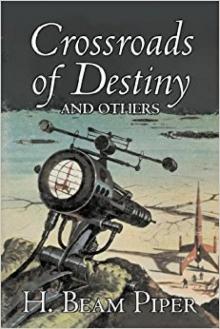 Crossroads of Destiny
Crossroads of Destiny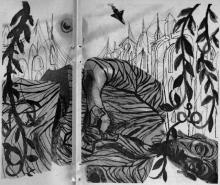 Graveyard of Dreams
Graveyard of Dreams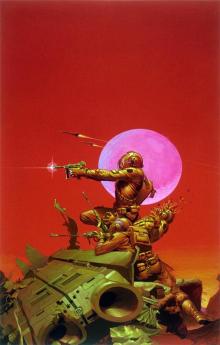 The Cosmic Computer
The Cosmic Computer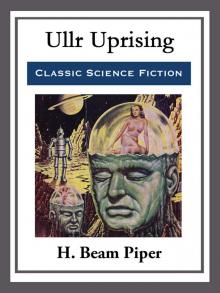 Ullr Uprising
Ullr Uprising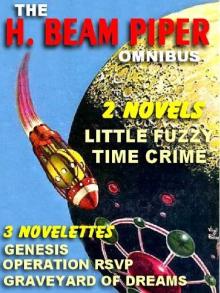 Operation R.S.V.P.
Operation R.S.V.P.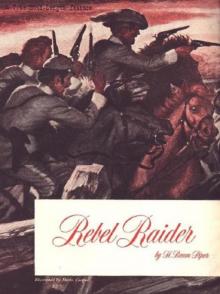 Rebel Raider
Rebel Raider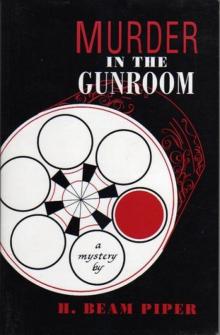 Murder in the Gunroom
Murder in the Gunroom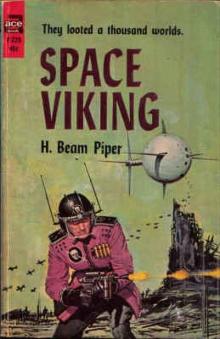 Space Viking
Space Viking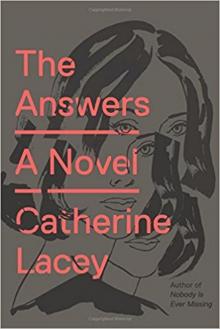 The Answer
The Answer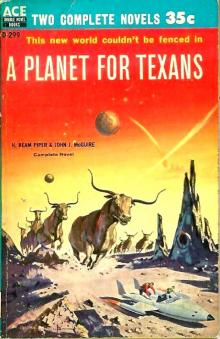 A Planet for Texans (aka Lone Star Planet)
A Planet for Texans (aka Lone Star Planet)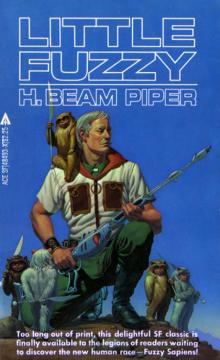 Little Fuzzy
Little Fuzzy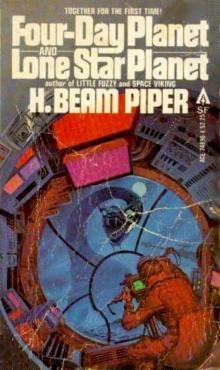 Four-Day Planet
Four-Day Planet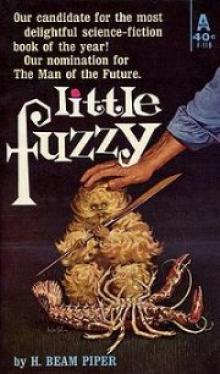 Little Fuzzy f-1
Little Fuzzy f-1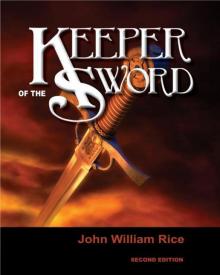 Keeper
Keeper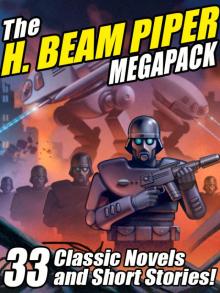 The H. Beam Piper Megapack
The H. Beam Piper Megapack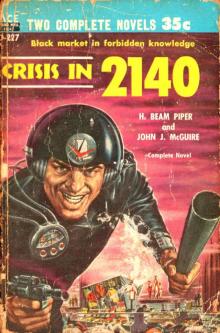 H. Beam Piper
H. Beam Piper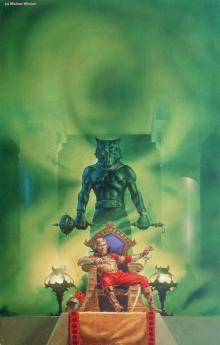 Lord Kalvan of Otherwhen
Lord Kalvan of Otherwhen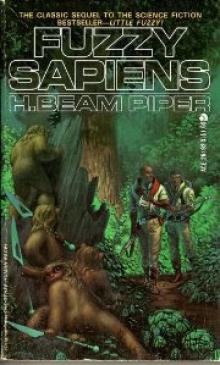 Fuzzy Sapiens f-2
Fuzzy Sapiens f-2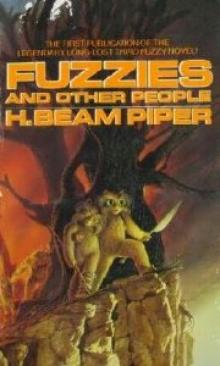 Fuzzies and Other People f-3
Fuzzies and Other People f-3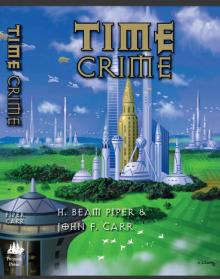 TIME PRIME
TIME PRIME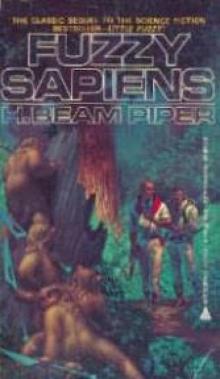 Fuzzy Sapiens
Fuzzy Sapiens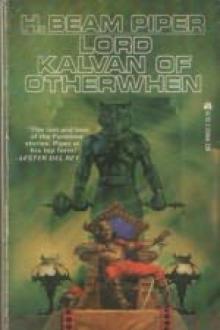 Lord Kalvan of Otherwhen k-1
Lord Kalvan of Otherwhen k-1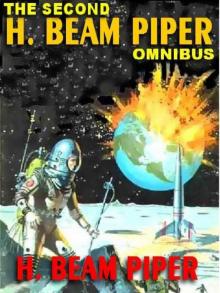 The Second H. Beam Piper Omnibus
The Second H. Beam Piper Omnibus